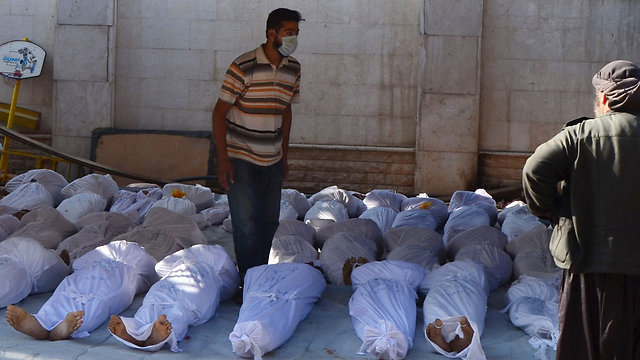The Syrian army's use of chemical weapons in the Damascus area Wednesday is indicative of self-confidence on the one hand and distress on the other. The self-confidence stems from the army's operational successes in Homs and Hama, which included massive fire. The distress stems from the army's inability to seize the rebel's stronghold in Damascus' eastern neighborhoods. There are even signs that the rebels, in this case members of the Free Syrian Army, are planning to expand the area in their control and advance towards the center of the capital. The pressured Syrian regime apparently fears such a development and therefore decided to use chemical weapons against civilians in these neighborhoods with the goal of deterring the Free Syrian Army fighters who seek shelter inside residential homes and operate from within them.
According to reports from the field, the Syrian army used missiles equipped with warheads loaded with sarin gas. The missiles were fired indiscriminately with the purpose of causing mass casualties. Eyewitness accounts indicate that the sarin gas was blended with other substances and was therefore not as lethal.
It must be remembered that the chemical weapons are being used as members of a UN delegation are confined to a Damascus hotel but can most likely see the chemical missiles being fired and the smoke billowing.
Even a cruel regime that is fighting for its life, as Assad's is, would not dare violate international law in such a blatant way without being certain it would not pay a price for such immoral and inhumane conduct.
President Assad knows the American threat to take operative action in response to chemical attacks has dissipated. Obama has declared he does not plan to intervene militarily in Syria, and General Martin Dempsey, chairman of the joint chiefs of staff, explained to Congress how difficult it would be for a US-led coalition to intervene in Syria or even impose a no-fly zone in the border areas.
Dempsey says an operation in Syria would require 700 or more sorties and mentions the expected interception of American planes by Syria's anti-aircraft system, but these are mere excuses meant to give the US legitimacy not to act in Syria. The Syrians sense weakness and are operating accordingly. They are also aware that Russia and China would support them in the Security Council in case the unimaginable happens and the US and Europeans do decide to act.
Thus, the use of chemical weapons has become almost routine in Syria. The regime is using these weapons although it is not in a situation where a sword is being held to its neck. The use of chemical weapons is meant to deter the opposition and the rebels, at times by attacking the non-combatant civilian population. This is a war crime that is taking place without any response from the international community.
Assad has ignored recent attacks attributed to Israel because he fears an Israeli response may put his regime and the entire Alawite sect in jeopardy. Members of the sect, which the Assad family belongs to, hold key positions in the Syrian government and army. The Alawites have found refuge in an isolated enclave, where the army defends them from Sunni rebel attacks. But getting involved in a military confrontation with Israel may dramatically change the balance of power and break the existing status quo in Syria. The regime and the Alawites would suffer most from this.
This is why Assad has ignored the attacks the foreign press says were carried out by Israel and is not even considering attacking the Jewish state with chemical weapons. However, the Assad government is becoming less and less apprehensive about its use of chemical weapons, and should the regime feel that it has nothing to lose it may also use chemical weapons against Israel. For now there are no indications Assad plans to use weapons of mass destruction against Israel, but Jerusalem must remain vigilant and continue to closely monitor the events in Syria.
It appears that the chances of reducing the use of chemical weapons in Syria are slim. Europe is condemning the chemical attacks but is not making any preparations to activate NATO. The US is losing its influence in the Middle East and it will not resolve the crisis either. Therefore, Israel can only trust itself, show restraint and refrain from intervening in the fighting. At the same time, Israel must also institute a policy of deterrence and make it clear that any crossing of the red line on the part of the Assad regime or the rebels will result in a fierce and uncompromising Israeli response.

















